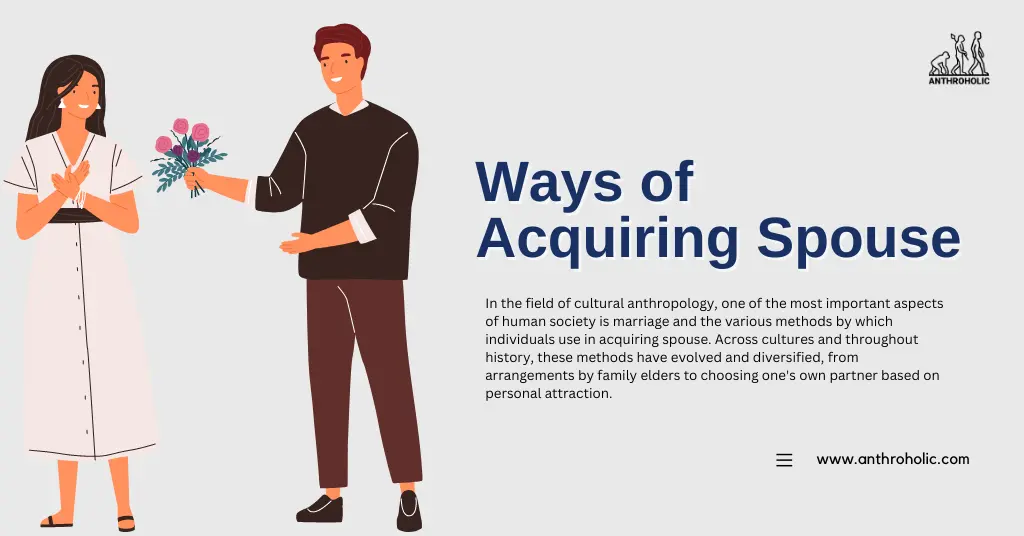AI Answer Evaluation Platform Live Now. Try Free Answer Evaluation Now
Ways of Acquiring Spouse
In the field of cultural anthropology, one of the most important aspects of human society is marriage and the various methods by which individuals use in acquiring spouse. Across cultures and throughout history, these methods have evolved and diversified, from arrangements by family elders to choosing one’s own partner based on personal attraction.

Arranged Marriages
One of the oldest and most widespread practices of spouse acquisition is arranged marriage. Here, family members, particularly parents or elder kin, play a significant role in choosing a spouse for their children.
- Arranged marriages in Asia: In many parts of Asia, particularly in South Asia, arranged marriages have been a dominant practice for centuries [1]. These marriages are often arranged by parents or elder relatives based on caste, social status, economic stability, and family reputation.
- Arranged marriages in Africa: In some African societies, marriages are arranged as part of strategic alliances between families or clans [2].
- Arranged marriages in Middle East: In Middle Eastern societies, arranged marriages often occur between relatives to maintain wealth within the family.
Self-Choice Marriages
As societies evolved and individual rights became more recognized, marriages based on personal choice gained prominence. These marriages are primarily based on mutual love, affection, and attraction.
- Self-choice marriages in Western societies: In Western societies, individuals are generally free to select their own partners. They often meet through social circles, online dating platforms, or workplace interactions [3].
- Self-choice marriages in Eastern societies: Though less common than in the West, self-choice marriages have gained traction in many Eastern societies over recent decades due to modernization and globalization [4].
Bride Capture
Though less prevalent in the contemporary world, bride capture has been practiced in numerous cultures historically. This involves abduction of the woman intended to be wed, often against her will.
- Bride capture in Central Asia: Historical accounts suggest that bride capture was common among nomadic tribes of Central Asia, though it has largely been outlawed today.
- Bride capture in Africa: Certain African tribes practiced bride capture as a form of marriage, with varying degrees of symbolic versus actual force used.
Levirate and Sororate Marriages
Levirate and sororate marriages involve marrying a sibling’s spouse, often after the death of the sibling.
- Levirate marriage: In this practice, a man is obligated to marry his brother’s widow. This was commonly practiced in ancient Hebrew society, and is still observed among some tribal communities.
- Sororate marriage: Here, a woman is required to marry her deceased sister’s husband. This practice was prevalent in Native American tribes and some Tibetan communities.
Table 1: Methods of spouse acquisition across the world
| Method | Example Societies |
|---|---|
| Arranged Marriage | India, Saudi Arabia |
| Self-choice Marriage | USA, Canada |
| Bride Capture | Historic Central Asia, Certain African tribes |
| Levirate/Sororate Marriage | Ancient Hebrew society, Native American tribes |
Conclusion
The ways of acquiring a spouse are numerous and deeply rooted in cultural, economic, and social contexts. Understanding these practices helps anthropologists and sociologists comprehend the complex nature of human societies and their evolving norms and traditions. The continued study of such practices also serves to highlight the dynamics of power, gender, and societal structure in different cultural settings.
References
[1] Ghimire, D. J., Axinn, W. G., Yabiku, S. T., & Thornton, A. (2006). Social Change, Premarital Nonfamily Experience, and Spouse Choice in an Arranged Marriage Society. American Journal of Sociology.
[2] Parkin, R. (1996). The Dark Side of Kinship: The Study of Manipulation and Breach of Trust in Marriage and Kinship Relationships in Africa. Anthropos.
[3] Finkel, E. J., Eastwick, P. W., Karney, B. R., Reis, H. T., & Sprecher, S. (2012). Online Dating: A Critical Analysis From the Perspective of Psychological Science. Psychological Science in the Public Interest.
[4] Jones, G. W. (2010). Changing Marriage Patterns in Asia. Asia Research Institute.




